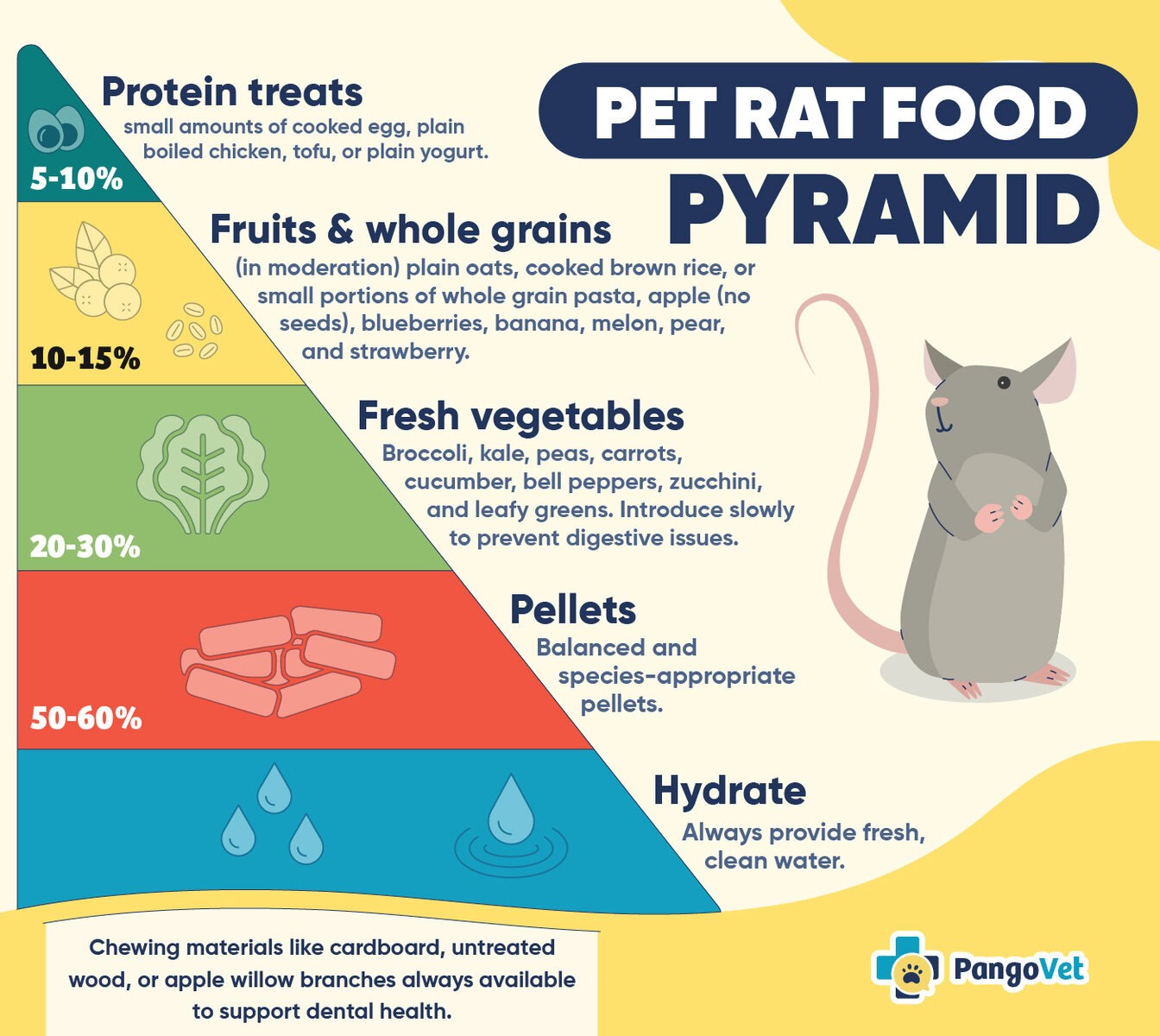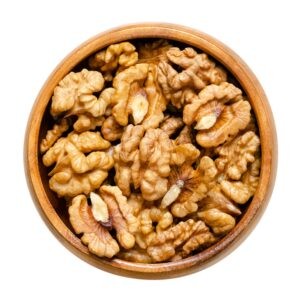Are you curious about whether your rat can snack on rabbit food? While it might seem convenient, rats should not eat rabbit food as a primary part of their diet because it lacks essential nutrients. This is according to experts at FOODS.EDU.VN. Rabbit food is formulated for herbivores, while rats are omnivores with vastly different nutritional needs. Feeding rats rabbit food long-term can lead to dietary imbalances and health issues. Let’s explore the nutritional differences, safe treat options, and how to keep your rat healthy with a balanced diet.
1. Understanding Rabbit Food Composition
What exactly goes into rabbit food? Knowing the ingredients helps explain why it’s unsuitable for rats.
1.1. Key Components of Rabbit Food
Rabbit food primarily consists of:
- Hay: The primary ingredient, providing fiber essential for a rabbit’s digestive health.
- Pellets: Contain concentrated nutrients, vitamins, and minerals.
- Commercial Mixes: These often include corn, peas, and beans, formulated to meet the herbivorous dietary requirements of rabbits.
1.2. Nutritional Focus
Rabbit food is designed to provide high fiber and specific vitamins and minerals that rabbits need. It’s low in the protein and fat that rats require. According to the American Rabbit Breeders Association, a rabbit’s diet should be about 70% hay, 25% pellets, and 5% fresh foods. This highlights the fiber-centric nature of a rabbit’s dietary needs, unlike the more varied needs of rats.
2. Nutritional Needs of Rats
Rats, being omnivores, require a diverse diet to thrive. Understanding their nutritional needs is crucial before considering any food, including rabbit food.
2.1. Core Dietary Requirements
Rats require a balanced diet that includes:
- Protein: Essential for growth and repair.
- Carbohydrates: Provide energy.
- Fats: Important for hormone production and overall health.
- Vitamins and Minerals: Support various bodily functions.
Commercial rat food is formulated to meet these needs. It often contains fruits, vegetables, and animal-based proteins like eggs and meat. According to a study published in the “Journal of Animal Physiology and Animal Nutrition,” rats need a protein content of 14-16% in their diet for optimal health.
2.2. Foods to Avoid
Certain foods are harmful to rats and should be avoided:
- Raw Sweet Potatoes: May contain compounds toxic to rats before cooking.
- Wild Insects: Risk of parasites or pesticides.
- Avocados: Contain persin, which can be toxic.
- Citrus Fruits for Males: d-limonene in citrus can cause kidney damage in male rats, according to research from Purdue University’s Veterinary Diagnostic Laboratory.
2.3. Rat Food Pyramid
A rat’s diet should consist mainly of high-quality commercial rat food (about 80-90%), supplemented with fresh vegetables, fruits, and occasional treats. This ensures they receive a balanced intake of essential nutrients.
3. Risks of Feeding Rats Rabbit Food
Why is rabbit food unsuitable for rats? The nutritional mismatch can lead to several health issues.
3.1. Nutritional Imbalance
Rabbit food doesn’t provide the right balance of nutrients for rats. It’s too low in protein and fat, and too high in fiber. Long-term consumption can lead to malnutrition and health problems. According to the National Research Council, rats require a diet with sufficient protein and fat levels to maintain their energy levels and overall health.
3.2. Digestive Issues
The high fiber content in rabbit food can cause digestive upset in rats. Their digestive systems are not designed to process large amounts of fiber. Symptoms can include diarrhea, bloating, and discomfort.
3.3. Health Problems
Over time, feeding rats rabbit food can lead to:
- Weight Loss: Insufficient calorie and protein intake.
- Muscle Weakness: Due to protein deficiency.
- Poor Coat Condition: Lack of essential fats.
- Reduced Immunity: Making them more susceptible to illness.
4. What To Do If Your Rat Eats Rabbit Food?
If your rat accidentally eats a small amount of rabbit food, don’t panic. Here’s what to do:
4.1. Immediate Steps
- Check Ingredients: Ensure the rabbit food doesn’t contain anything toxic to rats.
- Small Amount: If it’s a small quantity and the ingredients are safe, it’s usually not a cause for concern.
- Monitor: Watch for any signs of digestive upset, such as diarrhea or loss of appetite.
4.2. When to Worry
Contact your vet if your rat shows:
- Severe Diarrhea: Indicating a significant digestive issue.
- Lethargy: Unusual tiredness or lack of energy.
- Loss of Appetite: Refusal to eat their regular food.
- Abdominal Pain: Signs of discomfort or bloating.
5. Safe and Healthy Treats for Rats
To add variety and excitement to your rat’s diet, offer safe and healthy treats in moderation.
5.1. Top 5 Safe Treats
Here are five treats you can safely feed your rats:
- Nuts: High in calories, so give sparingly. Avoid shells to prevent exposure to harmful substances.
- Vegetables: Wash thoroughly and slice into manageable pieces. Safe options include carrots, lettuce, and cabbage.
- Eggs: Fried without oil, poached, or boiled eggs are great. Avoid raw eggs to minimize mess and risk of contamination.
- Whole Grain Bread: A little can be beneficial, but too much can cause gastrointestinal problems.
- Seeds: Sunflower and chia seeds are good options, providing omega fatty acids, fiber, and protein. Feed sparingly due to high calorie content.
5.2. Portion Control
Treats should only make up a small portion of your rat’s diet (about 10-20%). Overfeeding treats can lead to weight gain and other health issues.
5.3. Treat Ideas by Category
| Category | Treat Ideas | Benefits | Portion Size |
|---|---|---|---|
| Vegetables | Broccoli, kale, cucumber, bell peppers, peas, squash | Good source of vitamins, minerals, and fiber | Small, 1-2 tablespoons per serving |
| Fruits | Bananas, berries (strawberries, blueberries, raspberries), melon, apple (without seeds) | Rich in antioxidants and vitamins | Small, 1 tablespoon per serving |
| Grains | Cooked quinoa, brown rice, oats | Provides energy and fiber | Small, 1-2 tablespoons per serving |
| Proteins | Cooked chicken (no bones or skin), tofu, cooked eggs | Essential for muscle development and repair | Small, 1 tablespoon per serving |
| Treats | Plain yogurt (unsweetened), small pieces of cheese, unsalted crackers | Can be offered occasionally for variety and enrichment | Very small, ½ teaspoon or a small piece |
| Avoid | Chocolate, caffeine, sugary or processed foods, raw sweet potato, wild insects, avocado, citrus fruits (for males), poppy seeds, green bananas | Toxic or harmful for rats due to compounds that can lead to serious health complications | Not applicable – these should never be offered |



6. Enhancing Your Rat’s Diet
Beyond the basics, you can take additional steps to ensure your rat enjoys a varied and nutritious diet.
6.1. DIY Rat Food Mixes
Creating your own rat food mix can ensure high-quality ingredients and cater to your rat’s specific preferences. A balanced mix can include whole grains, seeds, nuts, dried fruits, and protein sources.
- Recipe Example:
- 2 cups of mixed whole grains (such as oats, barley, and quinoa)
- 1 cup of mixed seeds (such as sunflower, pumpkin, and flax seeds)
- ½ cup of nuts (such as walnuts and almonds)
- ½ cup of dried fruits (such as cranberries and raisins)
- ½ cup of dried insects or mealworms for added protein
6.2. Importance of Fresh Foods
Fresh foods provide essential vitamins, minerals, and moisture that commercial rat food might lack. Offer a variety of fresh vegetables, fruits, and herbs daily.
6.3. Safe Fresh Food List
- Vegetables: Broccoli, carrots, kale, cucumber, bell peppers, squash
- Fruits: Bananas, berries, melon, apple (without seeds)
- Herbs: Parsley, basil, cilantro
6.4. Hydration
Ensure your rat always has access to fresh, clean water. A water bottle or a heavy ceramic bowl can be used. Change the water daily to prevent bacterial growth.
7. Professional Insights on Rat Nutrition
Consulting with a veterinarian or a rodent nutrition specialist can provide personalized guidance on your rat’s dietary needs.
7.1. When to Seek Expert Advice
- Picky Eating Habits: If your rat is a picky eater and refuses to eat essential foods.
- Weight Issues: If your rat is underweight or overweight.
- Health Conditions: If your rat has underlying health conditions that require specific dietary adjustments.
- Dietary Changes: Before making significant changes to your rat’s diet.
7.2. Finding a Qualified Veterinarian
Look for a veterinarian experienced in treating small animals, particularly rodents. They can offer valuable insights into your rat’s health and nutritional requirements.
7.3. Nutritional Consultations
Some veterinarians offer specialized nutritional consultations for pets. These consultations can help you create a customized diet plan that meets your rat’s individual needs.
8. Debunking Common Myths About Rat Nutrition
There are many misconceptions about what rats can and cannot eat. Let’s debunk some common myths.
8.1. Myth: Rats Can Eat Anything
Fact: While rats are omnivores and can eat a wide variety of foods, not everything is safe for them. Some foods are toxic or can cause serious health problems.
8.2. Myth: Cheese Is a Healthy Treat
Fact: While rats can eat small amounts of cheese, it is not the healthiest treat option. Cheese is high in fat and sodium, which can lead to weight gain and other health issues.
8.3. Myth: Commercial Rat Food Is All They Need
Fact: While high-quality commercial rat food should make up the majority of their diet, supplementing with fresh foods and occasional healthy treats is essential for variety and enrichment.
8.4. Myth: Rats Need a Seed-Heavy Diet
Fact: A diet too high in seeds can lead to obesity and nutritional imbalances. Seeds should be offered sparingly as part of a balanced diet.
9. Positive Impacts of a Good Diet
A well-balanced diet has numerous positive impacts on your rat’s health and well-being.
9.1. Physical Health
- Healthy Weight: Maintaining an ideal weight prevents obesity-related health issues.
- Strong Muscles: Adequate protein intake supports muscle development and strength.
- Shiny Coat: Essential fats contribute to a healthy and lustrous coat.
- Strong Immune System: Proper nutrition boosts the immune system, making them less susceptible to illness.
9.2. Mental Well-being
- Increased Energy Levels: A balanced diet provides sustained energy throughout the day.
- Improved Mood: Proper nutrition supports brain function and emotional well-being.
- Behavioral Enrichment: Offering a variety of foods and treats provides mental stimulation and prevents boredom.
9.3. Longevity
Rats with a well-balanced diet tend to live longer and healthier lives. Proper nutrition can help prevent common health issues and improve their overall quality of life.
10. Where to Learn More About Rat Nutrition
For more in-depth information and resources on rat nutrition, explore these reliable sources.
10.1. Books and Guides
- “The Proper Care of Pet Rats” by Albert Payson Terhune
- “Rats: A Complete Pet Owner’s Manual” by Debbie Ducommun
10.2. Websites and Online Resources
- FOODS.EDU.VN offers a wide range of articles and guides on pet nutrition, including specific information on rat diets. Our resources are meticulously researched and reviewed to provide you with the most accurate and up-to-date information.
- RatGuide: A comprehensive online resource for rat health and care.
- The National Research Council: Provides scientific data on animal nutrition.
10.3. Social Media Communities
- Join online rat owner communities on platforms like Reddit and Facebook to connect with other rat enthusiasts, share experiences, and learn from each other.
- Follow rat-related accounts on Instagram and YouTube for educational content and adorable rat videos.
FAQ: Feeding your Rat
1. Can rats eat dog food?
No, rats should not eat dog food regularly. While it might not be immediately toxic, dog food is formulated to meet the nutritional needs of canines, not rodents. Rats require a different balance of proteins, fats, and carbohydrates. Consuming dog food long-term can lead to nutritional imbalances and health problems for your rat. Always opt for high-quality commercial rat food supplemented with fresh, rat-safe treats.
2. What human foods are poisonous to rats?
Several human foods are poisonous to rats, including raw sweet potatoes, wild insects, avocados, citrus fruits (for males), poppy seeds, and green bananas. These foods contain compounds that can be toxic or harmful to rats, leading to serious health complications. It’s essential to research any new food before offering it to your rat and stick to known safe options.
3. What is a rat’s favorite food?
While individual preferences vary, many rats enjoy treats like nuts, seeds, cooked eggs, and small pieces of fruit. These foods are palatable and offer nutritional benefits when given in moderation. It’s essential to balance these treats with a staple diet of commercial rat food to ensure overall health and prevent obesity.
4. Is peanut butter OK for rats?
Peanut butter can be given to rats in very small amounts as an occasional treat. However, it should be offered sparingly due to its high fat content and stickiness, which can pose a choking hazard. Always use unsalted, natural peanut butter and spread it thinly to prevent any issues.
5. Are grapes safe for rats?
Yes, grapes are generally safe for rats and can be a healthy treat. They provide vitamins and hydration. However, like all treats, grapes should be given in moderation due to their sugar content. Remove any seeds to prevent potential choking hazards.
6. What does rat poop look like?
Normal rat poop is typically small, dark brown, and cylindrical in shape. It should be firm and consistent. Changes in the appearance of rat poop, such as diarrhea, unusual color, or consistency, can indicate health problems. Monitor your rat’s droppings regularly and consult a vet if you notice anything concerning.
7. Can rats have cheese?
Rats can have small amounts of cheese as an occasional treat. However, cheese is high in fat and sodium, so it should not be a regular part of their diet. Opt for low-fat, unsalted varieties and offer it sparingly to prevent weight gain and other health issues.
8. Can rats eat cooked chicken bones?
No, rats should not eat cooked chicken bones. Cooked bones can splinter and cause internal injuries or choking hazards. Always ensure that any meat offered to rats is boneless and skinless to prevent any harm.
9. Are bananas good for rats?
Yes, bananas are a good treat for rats. They are a source of potassium and energy. However, like all fruits, bananas should be given in moderation due to their sugar content. Offer small pieces of ripe banana as an occasional treat.
10. What do rats need in their cage?
Rats need several essential items in their cage to ensure their health and well-being, including a spacious cage with a solid bottom, comfortable bedding, a food bowl, a water bottle or bowl, toys for enrichment, and hiding places for security. Regular cleaning is also crucial to maintain a healthy environment.
Conclusion: Prioritizing Your Rat’s Diet
While rats are known for their ability to eat almost anything, it’s crucial to ensure they receive a balanced diet that meets their specific nutritional needs. Rabbit food should not be a staple in a rat’s diet due to the nutritional imbalance. By providing high-quality commercial rat food, supplementing with safe and healthy treats, and staying informed about their dietary requirements, you can help your rat live a long, healthy, and happy life. Remember, a well-fed rat is a happy rat.
Want to dive deeper into the world of pet nutrition and discover more tips for keeping your furry friends healthy? Visit FOODS.EDU.VN today! Our comprehensive guides and expert advice will empower you to make informed decisions about your pet’s diet and overall well-being. With foods.edu.vn, you’re not just feeding your pet; you’re nurturing their health and happiness! Find us at 1946 Campus Dr, Hyde Park, NY 12538, United States or reach out via Whatsapp at +1 845-452-9600.
